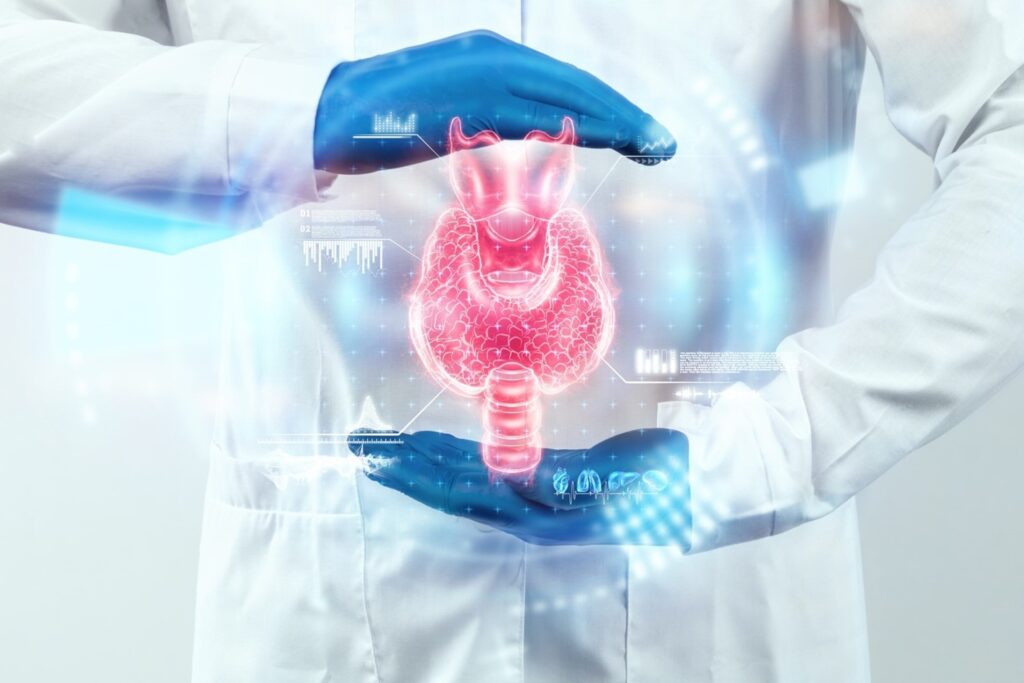Hypothyroidism is a condition where your thyroid gland doesn’t produce enough thyroid hormones. These hormones are important because they help control your body’s metabolism and energy levels. When you don’t have enough of them, it can affect many parts of your body. Here’s a simple guide to understanding hypothyroidism, including its symptoms, causes, and how to treat it.
What is Hypothyroidism?
Hypothyroidism happens when your thyroid gland, which sits at the base of your neck, doesn’t make enough thyroid hormones. These hormones—T4 and T3—are crucial for keeping your metabolism running smoothly. When hormone levels drop, it can slow down your body’s functions, leading to various health issues.
Common Symptoms
Hypothyroidism can cause a range of symptoms, and they often develop slowly. Some common signs include:
- Tiredness: Feeling unusually tired and low on energy.
- Weight Gain: Gaining weight without changing your diet or exercise habits.
- Cold Sensitivity: Feeling cold when others are comfortable.
- Constipation: Having trouble with bowel movements.
- Dry Skin and Hair: Skin and hair may become dry and brittle.
- Hair Loss: Experiencing more hair loss than usual.
- Muscle Weakness: Feeling weak or sore muscles.
- Depression: Experiencing mood changes or feeling down.
- Memory Problems: Having trouble concentrating or remembering things.
- Goiter: Swelling in the neck due to an enlarged thyroid gland.
What Causes Hypothyroidism?
Several factors can lead to hypothyroidism:
- Autoimmune Disease: Hashimoto’s thyroiditis is the most common cause. It’s an autoimmune disease where your immune system attacks the thyroid gland.
- Thyroid Surgery: Removing part or all of the thyroid gland can result in lower hormone levels.
- Radiation Therapy: Treatment for cancer can damage the thyroid gland.
- Medications: Certain medications, like lithium, can affect thyroid function.
- Iodine Deficiency: Iodine is needed for hormone production. A lack of it can lead to hypothyroidism, though this is rare in places with iodized salt.
How is Hypothyroidism Diagnosed?
To diagnose hypothyroidism, your doctor will:
- Ask About Symptoms: Talk about any symptoms you’re having.
- Do a Physical Exam: Check for signs like an enlarged thyroid gland (goiter).
- Order Blood Tests: Measure levels of thyroid-stimulating hormone (TSH) and thyroid hormones (T4). High TSH and low T4 usually mean hypothyroidism.
Treatment Options
The main treatment for hypothyroidism is taking thyroid hormone replacement medication. Here’s what you need to know:
- Medication: You’ll take a daily pill called levothyroxine, which replaces the missing thyroid hormones.
- Regular Check-Ups: Your doctor will monitor your hormone levels and adjust your medication as needed.
- Healthy Lifestyle: Eating well, exercising, and managing stress can help support your treatment.
Living with Hypothyroidism
With the right treatment, most people with hypothyroidism feel better and lead normal lives. Make sure to take your medication as directed and have regular check-ups. If you notice any new symptoms or if your current symptoms worsen, contact your doctor.
Hypothyroidism is a manageable condition. Understanding its symptoms, causes, and treatment can help you take charge of your health. If you think you might have hypothyroidism, see your doctor for a diagnosis and appropriate treatment. With the right care, you can keep your thyroid—and your health—on track.


